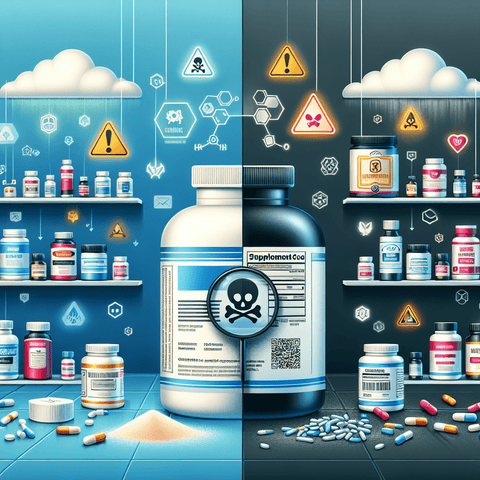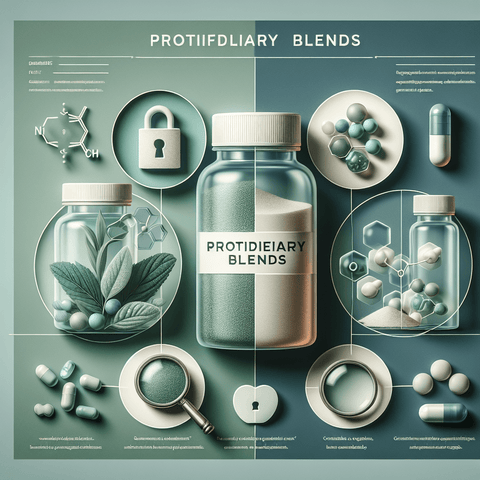Introduction
The global nutritional supplement market has surged in popularity over the past decade, driven by growing awareness of lifestyle diseases, the pursuit of optimal health, and a general increase in wellness-centric consumer behavior. Today, millions of health-conscious individuals rely on dietary supplements—ranging from essential vitamins and minerals to complex herbal formulations—to fill nutritional gaps, enhance immunity, support bone health, boost energy, and more. Alongside this demand, online shopping for supplements has witnessed a dramatic uptick due to its unmatched convenience and broader product availability. However, this digital convenience comes at a hidden cost. The proliferation of counterfeit supplements in online marketplaces poses a significant and growing threat. Counterfeit dietary supplements are illegally produced products that mimic authentic brands but contain unverified, substandard, or even harmful ingredients. These fakes not only defraud consumers financially but can result in severe health risks, including adverse reactions, toxic exposure, or ineffective treatment for nutritional deficits. As the health and wellness market continues to expand, consumers must educate themselves about the risks posed by counterfeit nutritional supplements. Staying informed isn't simply about protecting your wallet—it's about safeguarding your well-being and ensuring the effectiveness of a supplement regime. Whether you're sourcing Vitamin D for immune support or exploring the benefits of Omega-3 fatty acids, trusting the origin and quality of your purchase is vital. In this comprehensive guide, we will explore the dangers of counterfeit supplements, how to recognize red flags, tips for confirming authenticity, and expert strategies to guard yourself against digital scams. We'll also showcase how resorts such as Top Vitamine offer a safer alternative for buying verified supplements. By the end of this article, you’ll be equipped with the knowledge and tools necessary to make informed, secure purchasing decisions and ensure the supplements you use are genuinely supportive of your health.Understanding the Dangers of Counterfeit Supplements in the Nutritional Industry
Counterfeit nutritional supplements are imitations of legitimate products manufactured without regulatory approval, transparency, or safety standards. These unauthorized products often mimic the branding, packaging, and labeling of well-known supplement brands, intending to deceive customers into believing they're purchasing the real thing. Unlike food items or pharmaceuticals, nutritional supplements fall under a loosely regulated category in many jurisdictions, making them particularly vulnerable to fraudulent practices, especially when sold online. Broadly, counterfeit supplements can take various forms: - Products containing undeclared or banned ingredients - Supplements with contaminated, expired, or unlisted active substances - Items lacking the core nutrients advertised on the label - Replicas designed purely for visual similarity, devoid of any nutritional value These fakes aren't just ineffective—they're dangerous. Here are some associated health risks: 1. Allergic Reactions: Unlabeled substances or cross-contamination during illicit manufacturing increase the risk of serious allergies. For those with sensitivities (e.g., shellfish in Omega-3 supplements), the outcome could be severe. 2. Organ Damage: Some counterfeit supplements are laced with toxins such as heavy metals or unapproved pharmaceutical agents. Prolonged consumption may lead to liver damage, renal failure, or gastrointestinal disorders. 3. Nutrient Deficiency and Ineffectiveness: When a supplement lacks advertised active ingredients—like magnesium for muscle health or Vitamin C for immune function—the user may unknowingly remain deficient, assuming their dietary needs are being met. Beyond personal health risks, the spread of counterfeit supplements damages the credibility and bottom line of reputable supplement manufacturers. Brands invest significantly in research, quality assurance, and regulatory compliance. When fakes dilute the market, consumer trust deteriorates, legal oversight tightens, and legitimate businesses suffer price pressures and reputational harm. Online platforms, with their lax enforcement mechanisms, have allowed counterfeit operations to scale rapidly. These vendors hide behind anonymity, fake reviews, and complicated return/refund policies, leaving buyers powerless after a harmful or misleading purchase. Understanding the multifaceted danger of counterfeit nutritional supplements is the foundation of prevention. Consumers must adopt a skeptical, discerning approach when shopping outside trusted outlets like Top Vitamine, where every supplement undergoes stringent verification and quality checks.The Hidden Threats of Fake Dietary Supplements: What You Need to Know
Spotting the difference between authentic and counterfeit dietary supplements is not always straightforward—especially in a digital setting. Counterfeiters have become increasingly adept at duplicating the appearance, branding, and language of legitimate products. However, several telltale signs can help consumers distinguish real from fake supplements, provided they know what to look for. Let’s explore common red flags that indicate a dietary supplement may be counterfeit: 1. Unrealistic Health Claims: Beware of products that promise miraculous results—like “instant energy boost” or “cures all diseases.” According to EFSA (European Food Safety Authority), only specific, scientifically verified health claims are allowed on supplement labels. Overblown promises suggest shady marketing and questionable formulation. 2. Suspiciously Low Prices: Authentic supplements involve high production costs due to quality ingredients, testing, and regulatory compliance. Deep discounts or online “flash sales” that significantly undercut average prices are often bait used by counterfeiters to lure health-conscious but cost-sensitive shoppers. 3. Poor Labeling Compliance: Legitimate supplements must list active and other ingredients, manufacturer contact details, batch numbers, and expiration dates. Labels missing these or filled with grammatical errors and inconsistent formatting are key indicators of a fake product. 4. Third-Party Seller Anonymity: Platforms like generic e-commerce sites or social media storefronts often allow sellers to operate without verified business IDs. When the seller lacks a website, physical address, or transparent refund policy, the risk inherently rises. Regulatory agencies recognize the scale of the problem but often struggle to keep pace. In many countries, dietary supplements aren’t subject to the same pre-market safety assessments required for pharmaceuticals. While customs agencies occasionally intercept large shipments of illegal supplements, the decentralization of e-commerce makes these enforcement actions reactive, not preventive. Several global scandals have demonstrated the dangers of unchecked counterfeit supplement sales: - In the United States, the FDA routinely seizes illegal supplements containing undeclared prescription drugs like steroids, erectile dysfunction medicines, or stimulants. - European regulators have flagged cases where counterfeiters sold Vitamin D supplements spiked with excessive dosages, leading to vitamin toxicity among consumers. In light of these issues, vigilance is crucial. One of the safest practices is to engage with trusted retailers such as Top Vitamine, where product descriptions, authenticity guarantees, and transparent business practices form the standard protocol, ensuring you get what you pay for.How to Perform a Supplement Authenticity Check Before You Buy
Knowing how to verify the authenticity of a dietary supplement empowers consumers to make healthier and more secure choices. While spotting fakes might seem challenging initially, adhering to a structured verification process can significantly lower the risk of consuming counterfeit products. 1. Manufacturer Verification and GMP Compliance: Trusted supplement brands follow Good Manufacturing Practices (GMP), ensuring product consistency and safety. Always visit the official website of the supplement manufacturer to verify if the brand claims GMP certification and whether their manufacturing partners are registered with authorities like EFSA or FDA (in the U.S.). Reputable sites such as Top Vitamine typically highlight these credentials. 2. Label and Packaging Inspection: Pay close attention to packaging details. Authentic products will include:- Specific lot or batch numbers
- Clearly printed expiration dates
- List of ingredients and nutritional information panels
- Proper seals (tamper-evident and/or shrink wraps)
- USP (United States Pharmacopeia): Indicates tested for purity, potency, and performance.
- NSF International: Reviews manufacturing practices and verifies label claims.
- ConsumerLab: Independently tests supplements for ingredient identity and safety.
Avoiding Online Supplement Scams: Stay Informed and Protected
Online purchases might be convenient, but the vast digital marketplace comes with its own risks—especially when buying health products like dietary supplements. Scammers often exploit consumer demand with sophisticated traps meant to steal money or trick buyers into accepting counterfeit goods. Here are the most common types of online supplement scams: 1. Fake E-commerce Websites: These platforms imitate trustworthy supplement retailers in name and design. However, they often have:- No SSL certificate (URL won’t begin with “https”)
- Poor language on product pages
- Missing return, shipping, or refund policies
Identifying Fake Vitamins: Spotting the Differences from the Real Thing
While digital due diligence is excellent prevention, physical verification of supplements you've already received is equally crucial. When your order arrives, don’t rush to take the product. Perform these checks: 1. Examine Physical Traits:- Color and Texture: Authentic vitamins tend to have consistent coloring and smooth, well-compressed tablets or capsules. Fakes may be discolored, contain clumps, or crumble easily.
- Smell: Genuine supplements have a neutral or specific odor, depending on ingredients. A strong chemical or rancid smell can be a warning.
Supplement Safety Tips: How to Make Informed and Secure Choices
To ensure long-term wellness support from your supplements, adopt these proactive safety practices: 1. Choose Reputable Supplement Brands: Reputable manufacturers prioritize transparency, testing, and certification. Consider popular nutrients like Vitamin C or Vitamin D—always support brands listed on verified platforms like Top Vitamine. 2. Source From Certified Retailers: Purchase only from a manufacturer’s website, certified health stores, or trusted distributors. Avoid third-party listings unless explicitly authorized. 3. Keep Documentation: Save invoices, lot numbers, and order details. In case of adverse reactions, this information aids traceback and regulatory reporting. 4. Consult Healthcare Providers: Always speak to a doctor or registered dietician before beginning any supplement—especially if you’re managing chronic conditions or on medications. 5. Stay Informed: Keep learning! Browse articles, attend webinars, or subscribe to reputable platforms like Top Vitamine’s newsletter for the latest in supplement safety and innovation. Ensuring supplement safety isn't just about avoiding harm—it's about empowering yourself to achieve better health outcomes in an informed, conscious way.Conclusion
Counterfeit supplements represent a hidden and significant hazard in the digital age. As more people turn to dietary supplements to support immunity, energy, bone health, and cognitive function, the presence of fake products undermines not just personal health, but public trust in nutritional science. From allergic reactions and nutrient deficiencies to chronic toxicity, the consequences of unknowingly consuming counterfeit supplements can be life-altering. Recognizing red flags, verifying legitimacy, and staying informed about online scams are critical defenses. Consumers must become proactive guardians of their health. This guide offers the insights and tools needed to do just that—starting with verifying packaging, trusting only certified platforms like Top Vitamine, and consulting health professionals before incorporating any new supplement into one’s routine. For tried-and-tested, certified supplements ranging from Vitamin D to Omega-3, visit our online store. Subscribe today for expert health updates, and share this article with friends and loved ones—let’s collectively raise awareness about the risks of counterfeit supplements and how to avoid them.Q&A Section
Q1: What are counterfeit supplements?A1: These are unauthorized health products that mimic legitimate dietary supplements but may contain harmful or ineffective substances. Q2: Why are fake supplements dangerous?
A2: They can lead to allergic reactions, toxicity, organ damage, and nutrient deficiencies due to inaccurate or harmful ingredients. Q3: How can I recognize a fake supplement online?
A3: Watch for unrealistic health claims, unusually low prices, unreadable labels, and sellers with no transparent background. Q4: What should I do if I suspect I bought a counterfeit supplement?
A4: Stop using the product immediately, report to the relevant health authority, and notify the retailer if possible. Q5: Where can I safely buy tested and certified supplements?
A5: Trusted sources like Top Vitamine offer authentic products with certificate-backed verification.



